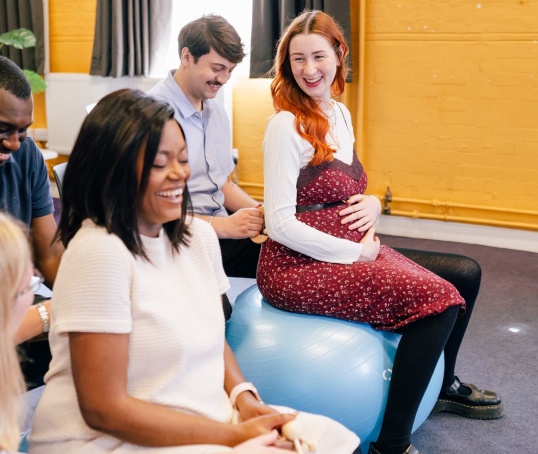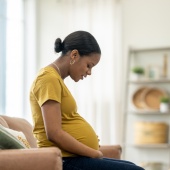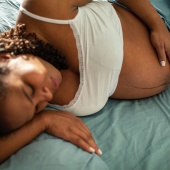What foods are safe or not to eat during pregnancy? Is there anything else that should be eaten? What about vitamin supplements? We look at nutrition during pregnancy and breastfeeding.
Being pregnant or breastfeeding doesn’t necessarily require eating more or new foods. However, it is important to try to eat a healthy, balanced diet. This includes:
Fruit and vegetables
At least five portions of fruits and vegetables (which can be fresh, dried, frozen, canned or juiced) every day as these provide vitamins and minerals. They also contain fibre, which can help prevent constipation (NHS, 2023a).
Carbohydrates
Energy-giving carbohydrates are an important part of a healthy pregnancy diet. They’re filling, which reduces the likelihood of snacking on foods high in fat and sugar. They also contain some vitamins and fibre. Carbohydrates include bread, potatoes, rice, noodles and breakfast cereals (NHS, 2023a).
Protein
Daily protein can be found in meat, nuts, beans, pulses, fish and eggs (NHS, 2023a).
Vitamins and supplements
A pregnant body also needs nutrients to nourish the growing baby. These can often be found in the everyday foods that the pregnant woman or person eats. In some cases, a supplement is recommended.
Folic acid
Folic acid is important before and during early pregnancy to help reduce the risk of the baby having a neural tube defect, such as spina bifida (NHS, 2023b).
Although leafy green vegetables contain the natural form of folic acid and some breakfast cereals and spreads are fortified with folic acid, it’s hard to get enough from food alone. So it’s important to take a daily supplement of 400 micrograms of folic acid (NHS, 2023b).
Take this when you start planning a pregnancy, or as soon as possible after you get pregnant, and for up to 12 weeks of pregnancy.
Iron and vitamin B12
A healthy diet in pregnancy contains iron and vitamin B12 to prevent tiredness and anaemia. They can be found in meat, fish, leafy vegetables, dried fruit and nuts, and fortified breakfast cereals. Also in milk, cheese, eggs and unsweetened soy drinks which are fortified with vitamin B12. Yeast extracts such as Marmite also contain B12 (NHS, 2023b; NHS, 2022a).
Iodine
Not getting enough iodine in pregnancy may affect the baby’s brain, potentially leading to reading challenges when older. When pregnant or breastfeeding, 200 mcg of iodine is needed a day to help the baby’s brain develop correctly. This is more than the usual adult needs so building up a store in the body before getting pregnant will help early development (BDA, 2022).
Cow’s milk, dairy products and eggs all contain iodine. Seafish and shellfish also contain iodine (NHS 2020), although make sure shellfish is cooked properly. Plants can contain iodine, but levels may vary. Some plant-based drinks are also fortified with iodine. Vegans might want to consider an iodine supplement during pregnancy and breastfeeding (NHS, 2022a).
Vitamin D
Vitamin D keeps bones, teeth and muscles healthy. You can find it in oily fish, eggs and red meat (NHS, 2023b).
It’s recommended that the pregnant woman or person also takes a daily 10 microgram (or 400 IU) vitamin D supplement. The best time to take it is with a meal or snack to help it being absorbed. This is especially important from September to March, as your skin produces vitamin D in response to summer sunlight. It’s hard for the body to produce enough during the winter months (NHS, 2023b).
People with Black or Brown skin are at risk of not having enough vitamin D, and should consider taking a supplement all year. This also applies to people who cover their skin or spend a lot of time indoors (NHS, 2023b).
Vitamin C
Vitamin C protects cells and keeps them healthy. It can be found in fruits and vegetables, particularly oranges, red and green peppers, strawberries, potatoes, brussels sprouts and blackcurrants (NHS, 2023b).
Calcium
Found in dairy products, fish where you eat the bones, and leafy green vegetables, calcium helps make the baby’s bones and teeth strong. You will also find calcium in bread made with fortified flour, tofu and soya drinks with calcium (NHS, 2023b).
Vitamin supplements to avoid
Make sure any supplements don’t contain vitamin A, which can be harmful to the baby. Multivitamins that aren’t for pregnancy are likely to contain Vitamin A (NHS, 2023b).
Free vitamins and low-cost food
England, Wales or Northern Ireland
If the pregnant woman or person receives certain benefits, or are under 18, they might be eligible for the Healthy Start scheme.
The Healthy Start card can be used to buy certain types of milk, fruit and vegetables and infant formula. They can also get vitamins for the pregnant parent and baby for free. Some NHS organisations also offer vitamins for free. Ask your midwife or health visitor about what’s available (NHS, 2023b).
Scotland
The Best Start Foods scheme is a payment that helps buy healthy foods. The free vitamin offer is universal, so speak to a midwife about how to access them.
Foods to limit or avoid
You don’t need to avoid peanuts during pregnancy, unless you have a peanut allergy (NHS, 2023a).
There are some foods to avoid or limit during pregnancy or breastfeeding as they could potentially harm your baby. These include:
Some dairy products
Dairy products to be avoided (NHS, 2023c):
- Any cheese made from unpasteurised milk, such as soft ripened goat’s cheese
- Mould-ripened soft pasteurised or unpasteurised cheese with a white coating on the outside, such as brie or camembert
- Pasteurised or unpasteurised blue cheeses, including gorgonzola or roquefort
- Unpasteurised cow’s, sheep’s or goat’s milk or cream
There’s a small chance that unpasteurised cheeses or dairy products contain a bacteria called listeria. This can lead to an infection called listeriosis, which can tragically cause a miscarriage or the baby to be stillborn.
Unpasteurised soft cheeses can be eaten if they’re cooked to steaming hot as this kills the bacteria. This is the same for cheeses with a white rind, which traps moisture and encourages bacteria to grow.
Pasteurised hard and soft cheeses are fine to eat during pregnancy, as long as they don’t have a white rind.
Uncooked meats
Cook meat through so there’s no pink or blood inside. Pay particular attention when cooking chicken, pork, sausages and burgers to ensure they’re cooked through. This is because there is a small risk of toxoplasmosis from raw or undercooked meat, which can cause miscarriage (NHS, 2023c).
Cold pre-packaged meat like ham is fine to eat. However, cured meat like salami or pepperoni should be cooked thoroughly before eating, as curing does not get rid of bacteria (NHS, 2023c).
Liver and paté, Vitamin A
Liver and liver products are high in vitamin A and should be avoided in pregnancy. Too much vitamin A can be harmful to the baby. Any type of paté, even vegetarian paté, also contains high amounts of vitamin A (NHS, 2023c).
Uncooked eggs that are not British Lion
Pregnant women and people shouldn’t eat raw or partially cooked eggs that are not British Lion (stamped with a lion) or Laid in Britain (NHS, 2023c).
British Lion hen eggs and those under the Laid in Britain scheme are fine to eat even if they are raw or runny. This is because they are less likely to have salmonella in them, which could cause food poisoning.
All eggs, even those without the British Lion stamp, can be eaten if they are cooked through, including duck, goose or quail eggs (NHS, 2023c).
Certain fish
Most fish is fine to eat during pregnancy, but there are some things to bear in mind (NHS, 2023c).
- Limit eating oily fish (salmon, trout, mackerel or herring) to twice a week, because they may have pollutants in them which are bad for the baby.
- Don’t eat more than two tuna steaks or four medium cans a week as tuna contains mercury. Too much mercury is bad for the baby. Tuna doesn’t count as oily fish.
- Avoid swordfish, marlin and shark as they contain high amounts of mercury.
- Avoid raw shellfish because they may contain harmful bacteria. Cooked shellfish, including mussels and prawns, is fine to eat.
- Don’t eat cold-smoked or cured fish, including sushi, smoked salmon and gravalax, as it may contain listeria bacteria. However, it is fine to eat if cooked to piping hot (and not just warmed in pasta, for example).
Caffeine
Restrict caffeine to 200mg a day while pregnant or breastfeeding, as too much might lead to low birth weight, miscarriage, or an overstimulated baby.
As a guide (NHS 2023c; NHS 2022d):
- One cup of instant coffee contains 100mg caffeine
- One mug of filter coffee contains 140mg caffeine
- One mug of tea (including green tea) contains 75mg caffeine
- A can of cola contains 40mg caffeine
- A 250ml energy drink contains an average of 80mg caffeine (energy drinks are not recommended during pregnancy and breastfeeding)
- A 50g bar of dark chocolate contains 25mg, milk chocolate contains 10mg
- Check the caffeine content of drinks from high street coffee chains by accessing the store's nutritional content document online.
- The amount of caffeine in herbal tea varies, from none to a significant amount. Some contain herbs which can be dangerous in high amounts in pregnancy. Sticking to one or two herbal teas a day should be fine.
Alcohol
If you drink during pregnancy, some alcohol will pass through the placenta to your baby (RCOG, 2018). Your baby's liver cannot process alcohol yet (NHS Choices 2018a). The more you drink, the greater the risk of harm to your baby (RCOG, 2018).
There is clear evidence that heavy drinking can affect the baby (BMA, 2016). This could include miscarriage, low birth weight, premature labour, still birth, and increased incidence of illnesses in infancy and childhood (RCOG, 2018; WHO, 2016).
However, evidence for low to moderate drinking is inconsistent and inconclusive (BMA, 2016). Some research found no negative effects on your baby, while others suggest potential negative effects (BMA, 2016).
So there is no clear evidence to suggest that drinking small amounts of alcohol during pregnancy is harmful or safe.
Coping with indigestion and heartburn
Indigestion and heartburn might increase during pregnancy and are more likely to happen when very full. Some things that can help (NHS, 2023d):
- Eating smaller meals more often, rather than three big meals a day
- Not eating within three hours of going to bed
- Sitting up straight when eating
- Cutting down on rich, spicy or fatty foods
- Limiting caffeine
Weight gain during pregnancy and breastfeeding
Everyone is different, but a normal weight gain is between 10kg and 12.5kg during pregnancy (NHS, 2022b). As well as the baby, this is extra fat to help breastmilk production, a larger uterus, the placenta, and the blood needed to keep everything healthy. However, there’s no need to ‘eat for two’ during pregnancy so long as you’re having a healthy and varied diet (NHS, 2023a).
Gaining more weight than is needed in pregnancy can lead to high blood pressure and the chance of complications (NHS, 2022b).
Gaining less weight than is needed can lead to low birth weight of the baby and premature birth. Some women and pregnant people won’t put on much weight at all during pregnancy. But for others, it can mean their body isn’t storing enough fat (NHS, 2022b).
Eating a healthy, balanced diet and doing moderate, regular exercise can help maintain a healthy weight gain during pregnancy and weight loss after birth. A midwife or GP can help with information on individual and group support for maintaining a healthy weight. If you join a weight-loss group, let them know you have recently had a baby and if you are breastfeeding (NHS, 2022c).
Weight loss injections during pregnancy
It is not known if weight loss injections are safe while trying to get pregnant, or during pregnancy or breastfeeding.
The Medicines and Healthcare Regulatory Agency (MHRA) advises anyone who is trying to get pregnant, or gets pregnant, to stop using them immediately. They should speak to their healthcare professional as soon as possible (MHRA, 2025). Find out more from MHRA.
Managing issues around eating
Most commonly after birth some people feel unhappy with their body, and this can lead to depression and disordered eating (Hodgkinson et al, 2014; Silveira et al, 2015). If struggling with issues around food during pregnancy or after birth, BeatEatingDisorders.org.uk has information that could help.
Fasting for religious reasons during pregnancy or while breastfeeding
During Ramadan, Islamic law states that you are not expected to fast if you’re pregnant or breastfeeding and worried about your health or that of the baby. Missed days of fasting can be made up by paying a ‘fidyah’ to provide food for someone in poverty (British Nutrition Foundation, No date).
Judaism observes several fast days. On two of these, Yom Kippur and Tisha B’Av, healthy pregnant women and people with uncomplicated pregnancies are expected to fast unless they feel they unable to for a particular reason. Always speak to your healthcare provider beforehand about fasting.
Other religions observe fast periods, and religious leaders will be able to advise on what is expected. For those who decide to fast during pregnancy or breastfeeding (British Nutrition Foundation, No date):
- Discuss the decision with a GP or midwife beforehand
- Consider fasting for some days and not others
- Watch out for signs of dehydration, such as dizziness, especially if fasting falls during the summer. If you feel weak or dizzy, break the fast with a sweet drink
- Don’t over-exert yourself
- Drink plenty and eat foods with a high water content when you break the fast
- Eat foods that release energy slowly, such as wholewheat bread and pasta
- Continue taking supplements such as folic acid
- If feeling generally unwell, contact the midwife or GP.
Further information
We offer antenatal courses which are a great way to find out more about birth, labour and life with a new baby.
Our NCT Infant Feeding Line offers practical and emotional support with feeding your baby and general enquiries for parents, members and volunteers: 0300 330 0700.
We also offer New Baby courses which are a great way for new parents to feel more confident.
Make friends with other parents-to-be and new parents in your local area and see what NCT activities are happening nearby.
BDA (2022) What is iodine and how does it help the body? https://www.bda.uk.com/resource/iodine.html [16 Sep 24]
BMA (2016) Alcohol and pregnancy: preventing and managing fetal alcohol spectrum disorders. Available at: https://www.bma.org.uk/media/2082/fetal-alcohol-spectrum-disorders-report-feb2016.pdf
British Nutrition Foundation (No date) Ramadan and pregnancy. https://www.nutrition.org.uk/nutrition-for/pregnancy/ramadan-and-pregna… [16 Sep 24]
Hodgkinson, E.L., Smith, D.M. & Wittkowski, A. (2014) Women’s experiences of their pregnancy and postpartum body image: a systematic review and meta-synthesis. BMC Pregnancy Childbirth 14, 330. https://doi.org/10.1186/1471-2393-14-330
MHRA (2025) GLP-1 medicines for weight loss and diabetes: what you need to know. https://www.gov.uk/government/publications/glp-1-medicines-for-weight-l… [5 Jun 25]
NHS (2018a). Drinking alcohol while pregnant. Available at: https://www.nhs.uk/pregnancy/keeping-well/drinking-alcohol-while-pregnant/
NHS (2020) Iodine https://www.nhs.uk/conditions/vitamins-and-minerals/iodine/
NHS (2022a) Vegetarian or vegan and pregnant. https://www.nhs.uk/pregnancy/keeping-well/vegetarian-or-vegan-and-pregn… [16 Sep 24]
NHS (2022b) Weight gain in pregnancy. https://www.nhs.uk/pregnancy/related-conditions/common-symptoms/weight-… [16 Sep 24]
NHS (2022c) Keeping fit and healthy with a baby. https://www.nhs.uk/conditions/baby/support-and-services/keeping-fit-and… [16 Sep 24]
NHS (2022d) Breastfeeding and diet. https://www.nhs.uk/conditions/baby/breastfeeding-and-bottle-feeding/bre… [16 Sep 24]
NHS (2023a) Have a healthy diet in pregnancy. https://www.nhs.uk/pregnancy/keeping-well/have-a-healthy-diet/ [16 Sep 24]
NHS (2023b) Vitamins, supplements and nutrition in pregnancy. https://www.nhs.uk/pregnancy/keeping-well/vitamins-supplements-and-nutr… [16 Sep 24]
NHS (2023c) Foods to avoid in pregnancy. https://www.nhs.uk/pregnancy/keeping-well/foods-to-avoid/ [16 Sep 24]
NHS (2023d) Indigestion and heartburn in pregnancy. https://www.nhs.uk/pregnancy/related-conditions/common-symptoms/indiges… [16 Sep 24]
RCOG (2018). Alcohol and pregnancy. Available at: https://www.rcog.org.uk/globalassets/documents/patients/patient-information-leaflets/pregnancy/pi-alcohol-and-pregnancy.pdf
Silveira, M.L., Ertel, K.A., Dole, N. et al. (2015) The role of body image in prenatal and postpartum depression: a critical review of the literature. Arch Womens Ment Health 18, 409–421. https://doi.org/10.1007/s00737-015-0525-0
WHO (2016) Prevention of Harm Caused by Alcohol Exposure in Pregnancy. Available from: https://www.euro.who.int/__data/assets/pdf_file/0005/318074/Prevention-harm-caused-alcohol-exposure-pregnancy.pdf






